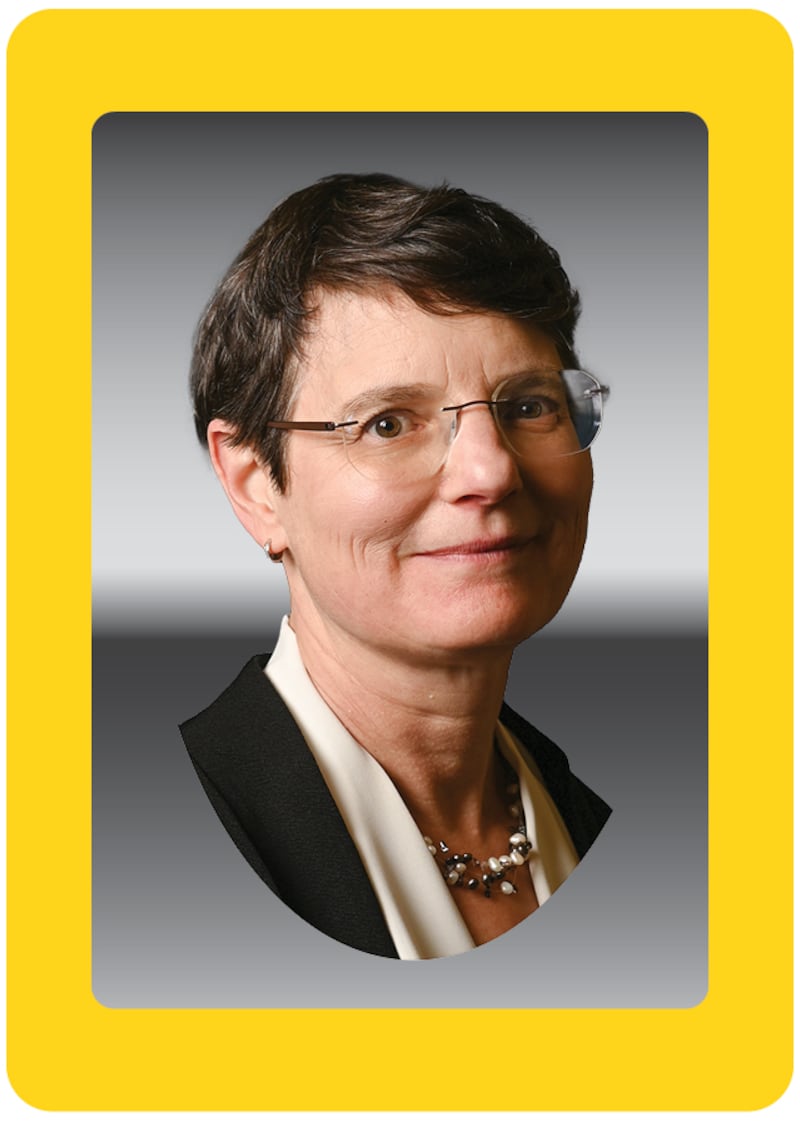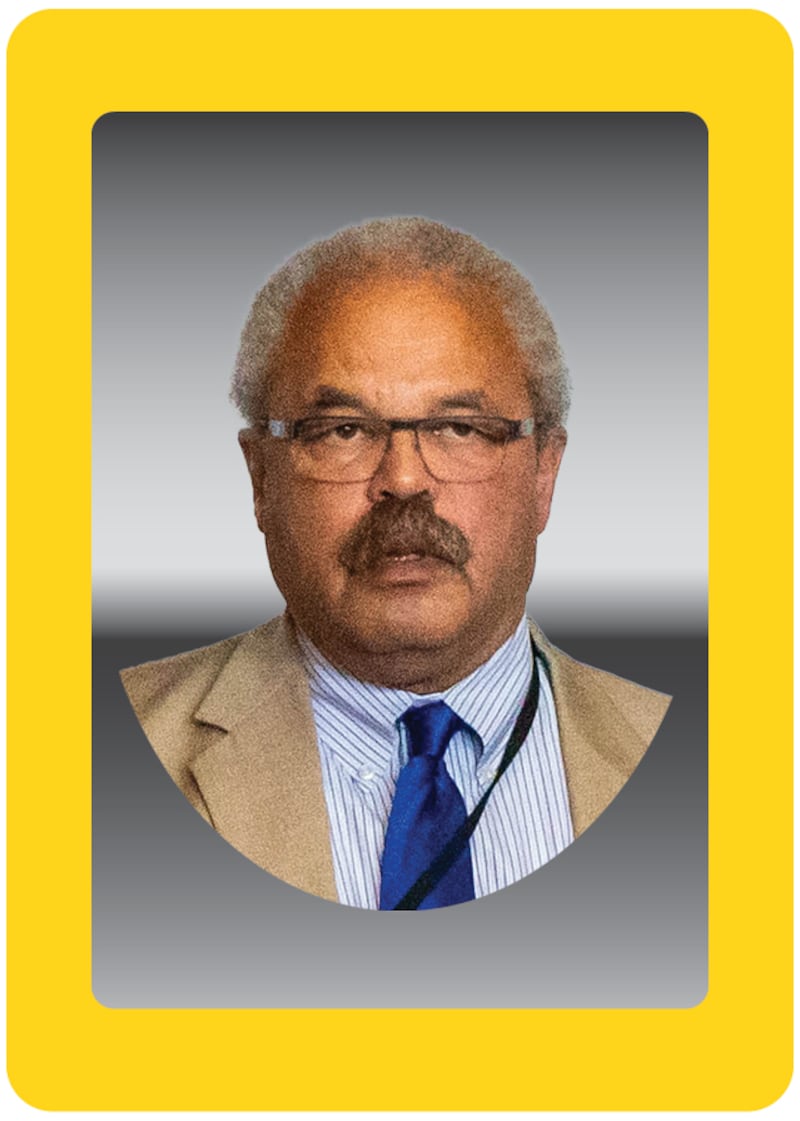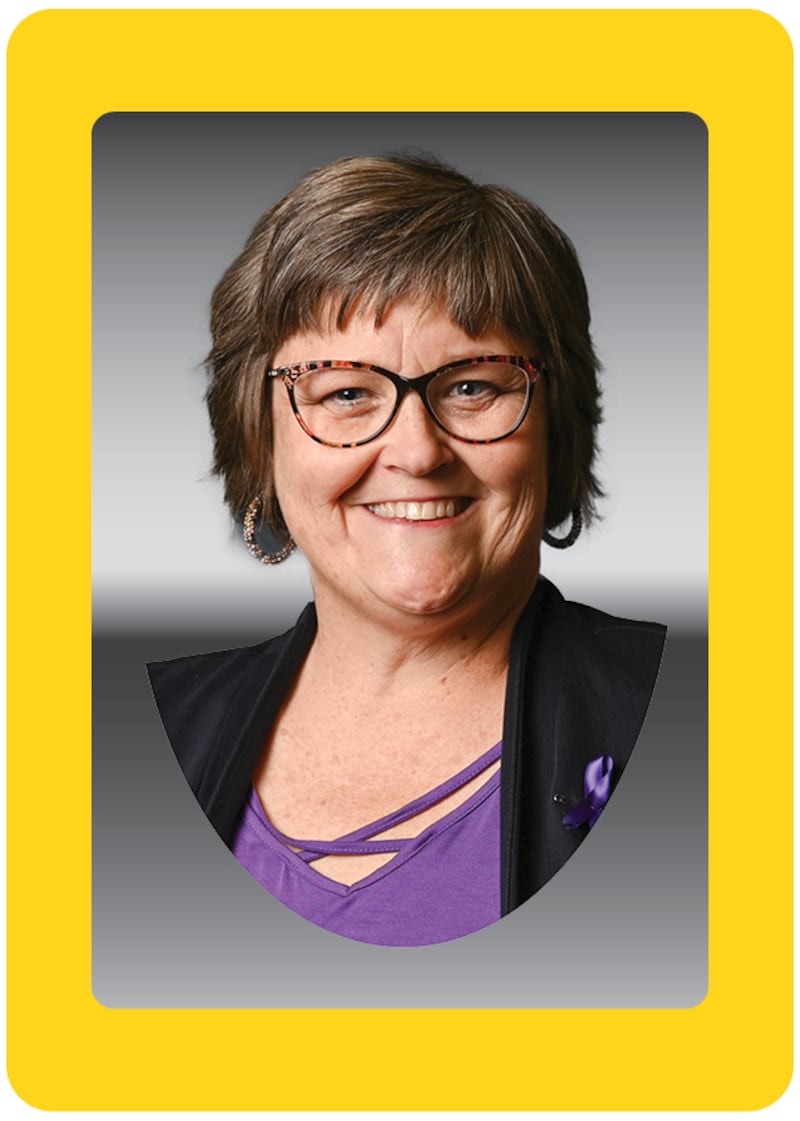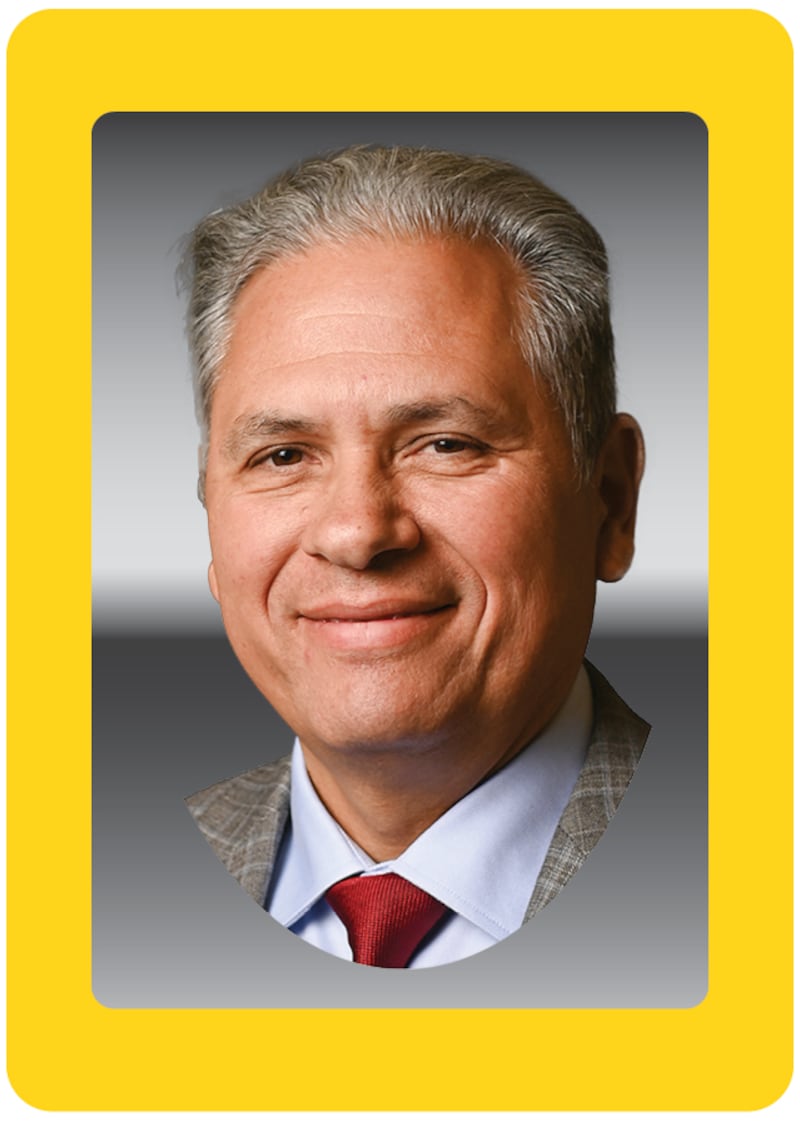The Excellent
Senate Majority Leader Kate Lieber (D-Southwest Portland)
Overall Rating: 8.26
8.31 Integrity
8.78 Brains
7.7 Effectiveness
Lieber, 56, a former prosecutor turned community college instructor, brings the skills both those jobs require: She’s capable of busting heads but also of herding cats. “She’s the future, and we are lucky for that,” says a health care lobbyist.
In a hidebound chamber where the average member is eligible for Social Security, Lieber’s energy and her sense of humor set her apart. No surprise that she rose to Senate majority leader in her first term and would be a good bet to replace Senate President Rob Wagner (D-Lake Oswego) if his colleagues decide his first term should also be his last.
The Good

Sen. Michael Dembrow (D-Northeast Portland)
Overall Rating: 7.69
8 Integrity
8.16 Brains
6.92 Effectiveness
A phlegmatic former community college English professor, Dembrow, 71, chairs the Senate Education Committee. “His humor is so dry it would kill a cactus,” says one staffer. “Wonderful person,” says a business lobbyist. “Has learned how to compromise to get results.”
Now in his 15th year in the Legislature, Dembrow passed a bill that expanded the opportunity to expunge juvenile convictions and another that aimed to improve drug treatment for inmates. A strong environmentalist, he also co-chairs the Joint Ways and Means Subcommittee on Natural Resources. A zenlike presence amid a needy group, he channeled his inner academic in a widely read newsletter. “Absolutely devastating when he leaves, as his newsletters were all some of us had to show employers and clients that we were ‘in the know,’” says one longtime lobbyist.

Sen. Elizabeth Steiner (D-Northwest Portland)
Overall Rating: 7.51
7.6 Integrity
8.07 Brains
6.86 Effectiveness
An intense family practice physician, Steiner, 60, like most of her medical colleagues, catches flak for reminding colleagues regularly of her credentials, but even her detractors consider her among the most intelligent lawmakers. “Book smart—did you know she’s a doctor?—but not street smart in terms of in-the-building skills,” says a lobbyist. As co-chair of the budget-writing Joint Committee on Ways and Means, she’s also among the most powerful and has enjoyed no longer having to share her gavel with Sen. Betsy Johnson (D-Scappoose), who left the Legislature to run for governor. “Hardworking and detail oriented—perfectly suited to crafting state budgets,” says a business lobbyist.

Sen. Kathleen Taylor (D-Southeast Portland)
Overall Rating: 7.12
6.98 Integrity
7.54 Brains
6.83 Effectiveness
A former auditor who brings an analytical mindset to lawmaking, Taylor, 56, fell short in a bid to replace Peter Courtney as Senate president. Already feared by many lobbyists, she became even tougher to approach. “Isolated from her caucus after a failed bid for president,” says a longtime observer. Taylor chaired the Senate Committee on Labor and Business effectively, although she infuriated many employers by unilaterally amending a bill that would have allowed hiring bonuses and put Oregon on an equal footing with other states. “Worst move of the session,” says a lobbyist. “Both public and private employers begged for it with strong real-world evidence.”
She led passage of Senate Bill 594, a labor-friendly bill that requires demolition jobs with more than $750,000 in public funding to pay union wages, and a bill that prohibits lobbyists from leading work groups that shape legislation. She also helped persuade Senate Republicans to return. “Can be tone deaf on some subjects and brilliant on others,” says a lobbyist.

Sen. Kayse Jama (D-Northeast Portland)
Overall Rating: 7.05
8.4 Integrity
7 Brains
5.73 Effectiveness
In his second long session, Jama made the difficult transition effectively from advocate to lawmaker. Born into a nomadic family in Somalia, Jama, 49, fled his home country as a refugee and landed in Portland 25 years ago. He founded the social services nonprofit Unite Oregon and was appointed to his seat after his predecessor, Shemia Fagan, won the secretary of state’s race in 2020. This session, he chaired the Senate Committee on Housing and Development, which required him to mediate between an industry hellbent on meeting Gov. Tina Kotek’s goal of producing 36,000 new housing units and environmental and land use advocates determined to protect the state’s natural resources. He won over some skeptics. “How he handled the explosive topic of statewide rent control, via Senate Bill 611, was demonstrative of true leadership,” says one business lobbyist.
The Average

Sen. Lew Frederick (D-Northeast Portland)
Overall Rating: 6.9
8.49 Integrity
6.61 Brains
5.61 Effectiveness
Frederick, 71, a former television newsman and Portland Public Schools spokesman, is a steady influence on his colleagues, which helps explain his astonishing workload: He has no less than nine committee assignments, including subbing for Sen. Chris Gorsek as co-chair of the Joint Committee on Transportation. Frederick led passage of bills that fix a loophole in rural fire districts and will outlaw a dangerous vehicle modification nicknamed the “Carolina squat” in which the front bumper is higher than the rear. Of all senators, Frederick scored the highest on integrity. “Conscience of the Senate,” says one longtime observer, “but needs to be more assertive.”

Sen. Aaron Woods (D-Wilsonville)
Overall Rating
6.81
8.26 Integrity
6.84 Brains
5.33 Effectiveness
In redistricting, Senate District 13 got sharply redrawn, eliminating the GOP voter registration advantage that enabled Sen. Kim Thatcher (R-Keizer) to hold it for two terms. Into that vacuum (and a new 14-point Democratic advantage) stepped Aaron Woods, a retired Xerox executive. Woods, at 73 the Senate rookie of the year, brought military discipline (he served for six years) and private sector experience. As a rookie, he got six committee assignments, a hefty workload, including co-chairmanships of the Joint Committee on Information Management and Technology and the Ways and Means Subcommittee on Transportation and Economic Development.
Views on Woods were mixed. “He’s been noticeably effective for a freshman, especially on issues where he can use his tech background,” says a business lobbyist. “He’s kept his head down as a freshman,” says another veteran lobbyist. “Too far down.”

Sen. Janeen Sollman (D-Hillsboro)
Overall Rating: 6.59
7.49 Integrity
6.12 Brains
6.18 Effectiveness
Some lawmakers become closely associated with one issue. Sollman, 53, a longtime Hillsboro School Board member and employee of an educational software company, is among them. As she has testified, she grew up the daughter of a physically abusive father, which shaped strongly held views on domestic violence and substance abuse legislation. “One of the biggest hearts in the Legislature,” says a respondent.
Capitol denizens love the pancakes she periodically cooks on a portable griddle. “Word spreads like wildfire,” says one regular. This term, Sollman chaired the Senate Committee on Energy and Environment and co-chaired the Joint Committee on Semiconductors, which passed her bill to get $200 million to entice new investment. “Shined in her work on the Joint Semiconductor Committee and behind the scenes on related efforts,” says a business lobbyist.

Sen. Mark Meek (D-Gladstone)
Overall Rating: 6.59
6.99 Integrity
6.47 Brains
6.31 Effectiveness
Meek, an Air Force veteran who ran bars before moving into real estate brokerage and management, is the Senate everyman—and also a noted crooner who reliably sings “Happy Birthday” to whomever is celebrating. And with Betsy Johnson gone, the first-term senator has inherited her position as the moderate in the Democratic caucus around whom some closely fought bills pivot. “Adeptly figured out how to leverage his position as a key vote to push through his priorities,” says a Senate insider.
Meek, 59, chaired the Senate Committee on Finance and Revenue, a lower-stress post than in other sessions because of the state’s overflowing tax receipts. Like Johnson, Meek incurred the wrath of progressives. One calls him “a vengeful weasel, threatening the caucus agenda in order to placate the moneyed real estate interests.”

Sen. Chris Gorsek (D-Troutdale)
Overall Rating: 6.28
7.42 Integrity
5.95 Brains
5.47 Effectiveness
A former Portland cop turned community college geography professor, Gorsek, 65, possesses an unusual biography. “An old-school Democrat rather than an ideological one, he’s a voice of moderation in his caucus and a no-BS guy,” says a lobbyist.
Gorsek missed much of the session because of open-heart surgery, and by the time he returned in early June, the Senate Republicans were gone. “His colleagues think well enough of him that senators on both sides of the aisle adopted his bills when he went out on medical leave,” notes a lobbyist. Two of his priority bills, SB 615, which makes it easier for cops to crack down on street racing, and SB 256, protecting Oregonians against fake airbags in vehicles. Colleagues felt Gorsek’s absence as co-chair of the Joint Committee on Transportation. That committee’s agenda included funding a new Interstate Bridge and finding a path forward on tolling. Both efforts went mostly sideways.

Sen. Suzanne Weber (R-Tillamook)
Overall Rating: 6.28
7.42 Integrity
6.58 Brains
4.85 Effectiveness
Although Weber’s home is on the coast, her newly drawn district sprawls from Astoria to Lincoln City and into western Multnomah County, making it among the most politically diverse and evenly balanced in the state (registered Republicans outnumber Democrats by 1.2%). A retired elementary schoolteacher and former mayor of Tillamook, Weber, 76, brings a softer touch to Salem than her longtime predecessor, centrist Democrat Betsy Johnson, although lobbyists were surprised at the zeal behind her conservatism. “She’s got a lot of Jesus in her,” says one.
Weber served as vice chair of the Senate Committee on Education but made little impression before Republicans walked out. “Extremely kind and surprisingly quiet,” says a staffer. “Her reputation in the House was ‘grandma bulldog,’ but I don’t recall seeing it much so far in the Senate.”

Senate President Rob Wagner (D-Lake Oswego)
Overall Rating: 6.18
6.4 Integrity
6.95 Brains
5.18 Effectiveness
Seldom has anyone risen faster in Salem than Wagner, 50, who before his appointment in 2018 to replace Sen. Richard Devlin (D-Tualatin) worked in administration at Portland Community College and before that as longtime lobbyist for the American Federation of Teachers. Always ambitious, Wagner vaulted to the head of the pack of lawmakers itching to succeed Senate President Peter Courtney (D-Salem), who ruled the Senate for two decades. The father of four has little time for one of his favorite hobbies—playing the guitar—as he tries to ride herd on the fractious Senate. Many observers blame him for the duration of the Republican walkout. “A very effective majority leader, he’s proven the Peter Principle as Senate president,” says a longtime lobbyist.
He is still learning, but it’s unusual for a chamber leader to score so low. “Has the charisma and charm of a used mattress salesman,” says a progressive lobbyist.
The Bad

Sen. Daniel Bonham (R-The Dalles)
Overall Rating: 5.66
6.14 Integrity
6.5 Brains
4.33 Effectiveness
A gregarious purveyor of wood stoves and hot tubs, Bonham, 46, moved up to the Senate this session after the retirement of Sen. Chuck Thomson (R-Hood River). He won a seat in a district where Democrats hold a 2-point voter registration advantage, in part because he acquitted himself well in two House terms and has shown a willingness to cross the aisle. (Bonham was the chief sponsor of Senate Bill 449 that passed before the walkout and expanded college tuition and breaks on all fees for foster children who have been adopted.)
A fiery competitor in the Senate vs. House basketball game, which his team won this year, he broke two teeth and bent his back in this year’s contest. (In a bipartisan moment, Rep. Hai Pham [D-Hillsboro], a dentist, helped with on-court emergency dental care.) He hasn’t fared much better on the job. “Smart, tough cookie,” says one lobbyist, “but brash style makes him ineffective in the minority.”

Sen. Wlnsvey Campos (D-Aloha)
Overall Rating: 5.44
6.97 Integrity
4.97 Brains
4.37 Effectiveness
By far the youngest member of the Senate at 27, Campos moved up after just one term in the House to claim a seat long held by Senate Majority Leader Ginny Burdick (D-Portland). “Has a lot of potential, but she has yet to realize how to effect change,” says a progressive lobbyist. Many found her hard to read: “Lobbying her is like lobbying a houseplant.”
Campos, who grew up on the Central Coast and was often housing insecure as a child, has worked as a case manager for a transitional housing nonprofit. She co-chaired the Ways and Means Subcommittee on Human Services. “Not always clear she’s paying attention in committee and isn’t a curious person in meetings,” says a health care lobbyist.

